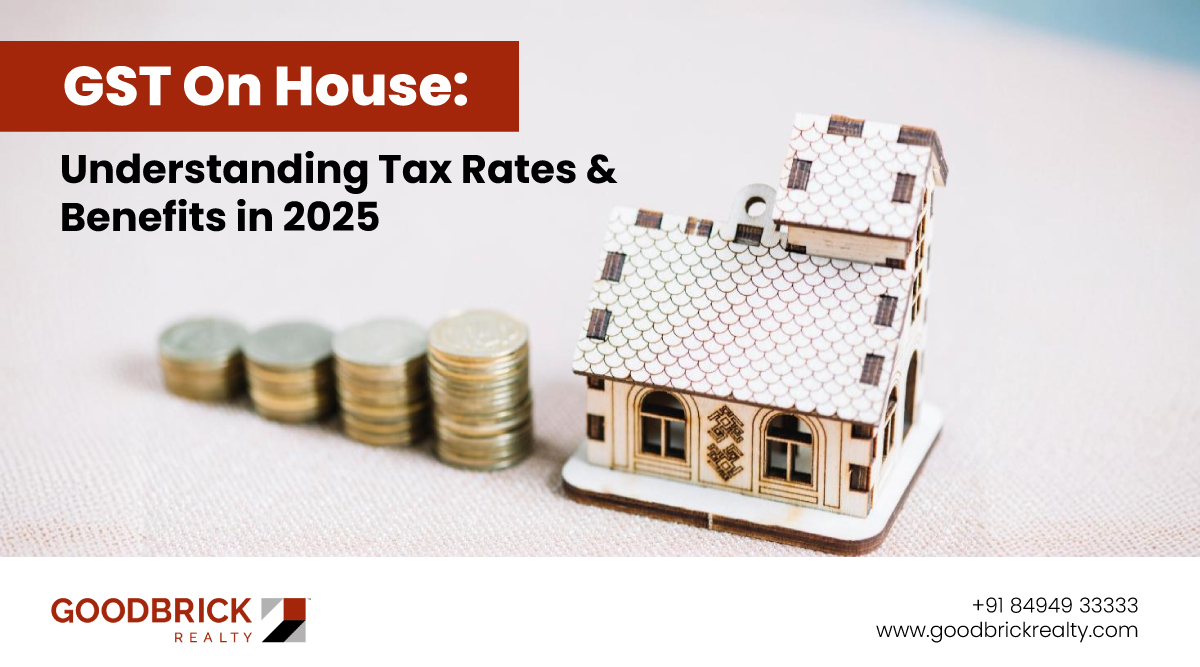
In the present era, the Goods and Services Tax (GST) has impacted the real estate market. With its introduction, the tax structure has now been streamlined. Moreover, every real estate transaction is made under a single tax structure. This is applicable to commercial and residential properties. But, there are certain exemptions for under-construction properties. Apart from everything else, GST eliminates the cascading taxes and the complexity. So, scroll through to find more about GST on house in 2025. But, before moving ahead, let’s check more about ITC (Input Tax Credit).
ITC under GST allows businesses to reduce taxes they have to pay on purchases. This can be done by subtracting the GST they’ve already paid on other things. But, this benefit can’t be availed for properties bought for personal use.
For instance, if a real estate developer has bought construction materials at a price of Rs. 20,00,000, then he can claim ITC. This figure can be calculated with 18% GST. Once he claims ITC (Rs. 36,000), it reduces the tax liability at the time of selling.
As of February 2025, GST on house purchases in India is applicable as follows:
Presently, the Indian government has introduced many home buying tax benefits. This has encouraged many individuals to invest in the real estate sector.
Under the new tax regime, the tax exemption limit has been increased to Rs. 12,00,000 per year. This change enables individuals to save more for home purchases. It can also reduce the burden while paying off a loan.
If someone is buying a house for the first time, then he can benefit from an additional deduction. This is equivalent to a deduction of up to Rs. 50,000 per annum. This provision is also applicable to loans approved between April 1, 2019, and March 31, 2022. But, the stamp duty value must not be more than Rs. 45,00,000.
As per the Union Budget 2025, self-occupied properties are also eligible for tax exemptions. Homeowners can currently claim up to two properties as self-occupied. This thereby removes the tax liability on notional rental income.
Just recently, the Reserve Bank of India has reduced the repo rate to 6.25%. Thus, homebuyers can take a home loan at a lower interest rate. They will not feel the burden of paying off the loan ahead.
According to numerous sources, the real estate GST framework includes many exemptions. Regardless of whether or not the land is developed, the sale is exempted from GST. This norm applies even when the land has undergone infrastructure development. But, under the Joint Development Agreements (JDAs), GST implications on houses can be complex. The tax liability will then depend on the agreement’s nature. It can also depend on the type of property that is under development. Besides, the buyer has to bear stamp duty or registration charges separately. These are not considered under the GST framework.
Now, let’s check how GST can be calculated.
Let’s say that you have purchased a flat worth Rs. 20,00,000. In such a case, the property falls under affordable housing and a 1% GST rate is applicable.
Later, you have to find out the GST amount by multiplying the property’s price with the rate.
Now, you have to add the GST amount to the actual price. This will be equal to the total price of the house.
In this case, the GST = Rs. 20,00,00 * 1% = Rs. 20,000.
Therefore, the total price of the house is Rs. 2,20,000.
There are numerous things that you must consider before buying a house.
Besides the above aspects, you must research the potential for value appreciation. As years pass by, the real estate market tends to fluctuate. Hence, it’s better to comprehend the trends before investing.
Finally, it can be tricky to navigate GST in the housing market. This is because an individual has to understand the tax rates in 2025. For under-construction residential properties, the GST is set at 5%. But, for commercial properties under construction, the tax rate is 12%. A reduced rate of 1% is also applicable for affordable housing projects. Beyond this, the buyer has to bear stamp duty and registration charges.
If you wish to relish opulence and luxury, then why not consider a house built by Goodbrick Realty? While we develop houses, we blend comfort and functionality. Every nook and corner of the indoor space is also thoughtfully designed.